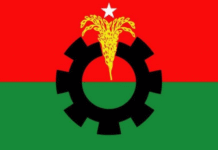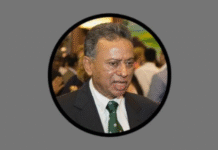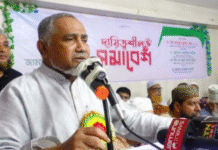Criminal gangs, militants, and freelancing ruling party men are getting involved with arson and bomb blasts
As the BNP-led alliance’s non-stop action programme approaches its third month, with little let up in cases of arson and bus burning, the atrocities are gradually taking the shape of organised crime.
In countrywide joint drives, law enforcement agencies have so far arrested more than 7,000 people in connection with deadly violence since the blockade, which has claimed more than 70 lives, began on January 6.
But nearly all those arrested are field-level operatives and the main planners who pull the strings from behind the curtains remain out of the law’s reach.
Law enforcement agency sources said roughly 60% of those arrested are supporters of the BNP, 30% of Jamaat, and the rest are hired criminals and members of militant organisations.
In the pre-election violence in 2013, lawmen made around 15,000 arrests in connection with 1,500 violence cases. None of them ever went to trial because law enforcers did not want to waste resources for the minnows. Consequently, they were all freed on bail. Sources said some of them have been arrested again this year.
There are several reasons why the main perpetrators could not be brought to book.
Hired hands
First, the ambushes are mostly being carried out by hired criminals, although the ongoing action programmes are part of a political movement of a political alliance.
These criminals, who have their ways of evading the law’s radar, have got involved for hefty payments because more and more political activists are either falling into the law enforcers’ dragnet or are going into hiding to avoid arrest.
As a result, the cost of carrying out petrol bomb attacks and exploding crude bombs is climbing. When the unrest began in January, supporters of BNP-Jamaat or petty criminals hurled bombs for Tk500 or Tk1,000. But the Dhaka Tribune has learned that organised criminal gangs are now charging Tk10,000-Tk25,000 for the same job.
On January 24, around 30 people received burn injuries in a bus burning at Jatrabari in Dhaka. Sources said the attack was planned by Jamaat-Shibir men but was carried out in the field by members from the gang of Amir Hossain, a notorious Narayanganj-based drug dealer. The petrol bombs were allegedly supplied by Amir’s associates Hasan and Saju.
“Among those arrested in recent times, not too many are from the Jamaat-Shibir camp because most of them are hiding. They are basically training others on how to make bombs and set them off,” said a police official, seeking anonymity.
On January 21, police arrested five Shibir men in Mohakhali of Dhaka and recovered a large quantity of bomb-making materials from their possession.
Sources said law enforcers have made a list of nearly 3,500 BNP-Jamaat men who are involved in carrying out violence across the country. Some of these leaders have already been arrested.
Militants making hay
Second, several militant organisations are trying to take advantage of the prevailing unrest by carrying out some of these attacks. Police said they have already identified a pattern that hints at militant involvement with some ambushes that appear as regular political atrocity.
“There is a clear difference in the ways professional criminals and militants operate. Militants have training; so when they firebomb a vehicle, it gets fully charred,” said an official from the Detective Branch (DB) of Dhaka Metropolitan Police (DMP), seeking anonymity.
“But political activists and professional criminals do not have the kind of training that militants have. So, when they firebomb, in most cases only parts of a vehicle get damaged,” the DB official explained.
Earlier this month, police arrested 27 people in Dhaka for their suspected involvement in violence. Of these, two are members of the banned Islamist outfit Hizb-ut Tahrir.
In another recent drive, police arrested three Tahrir members in Dhaka. In a text message, Masudur Rahman, deputy commissioner of DMP, informed reporters that they had been arrested for their suspected involvement in violence.
Some Tahrir men arrested in recent times have disclosed during interrogation that they had joined the protests to raise their voice against irregularities and establish an Islamic state in Bangladesh.
AL freelancers
Third, a section of ruling Awami League supporters have been rounded up in recent weeks in connection with violence. Some of them were picked up with bombs and bomb-making materials; others were injured in explosions when they were making bombs.
There are allegations that some men from the ruling party and its associate bodies have taken up the political unrest as a means for making some money. Since police tend to be soft towards them, some have been making and selling bombs.
On February 22, a RAB team detained a Chhatra League leader named Nur and his elder brother, who is a BNP leader, with bombs from a CNG-run autorickshaw garage in the capital’s south Keraniganj, but described both as drivers while suing them.
Chhatra League’s Dhaka district unit General Secretary Monir Hossain confirmed that Nur is the joint convener of one of their local units, but claimed that he was not involved with making bombs.
On February 5, police arrested Manik and Babul, two leaders of Jubo League in Comilla, for having crude bombs in their possession. However, police later allegedly released them without taking any action.
A state intelligence agency has recently reported that some unruly leaders of the Awami League are tarnishing the government’s image by creating unrest in exchange of money, but law enforcers have not yet taken any action against them.
The intelligence report says more than 320 people are involved in making crude bombs in the country; of these, 26 belong to the ruling party.
Moreover, around 40 ruling party men are involved with supplying crude bombs around the country, the report is said to have suggested.
However, the number of these arrested ruling party leaders is very small and they do not hold any posts in the party or any of its associate bodies, the report said.
But the Dhaka Tribune has managed to collect the names of several ruling party leaders from outside the capital who hold party posts and are also staging violence. They include Abdullah Al Mamun, secretary of Kustia district unit Chhatra League; and Bappi Biswas Raju, secretary of Khoksa upazila unit Chhatra League, also in Kushtia.
Golam Murtoza Khasru, president of Kushtia district unit of the ruling party’s student front, however claimed nobody from his organisation was involved in carrying out atrocities.
In Feni, local Jubo League Joint Convener Jiaul Alam Mister, who is now in jail as a prime suspect in the Ekram murder case, is allegedly controlling violence using his men in the area.
AKM Shahidul Haque, inspector general of police (IGP), told the Dhaka Tribune: “The arsonists caught red handed are either from the Chhatra Dal, Jubo Dal, Chhatra Shibir, or people they have hired. They have disclosed their identities and confessed their crimes during interrogation.”
When asked about the alleged involvement of ruling party men, the police chief said the people they had arrested so far either belong to BNP-Jamaat or are hired criminals.
“But to us, the arsonists are just criminals, their political affiliations do not matter. Action will be taken against all the miscreants no matter which party they belong to,” the IGP affirmed.
Source: Dhaka Tribune










